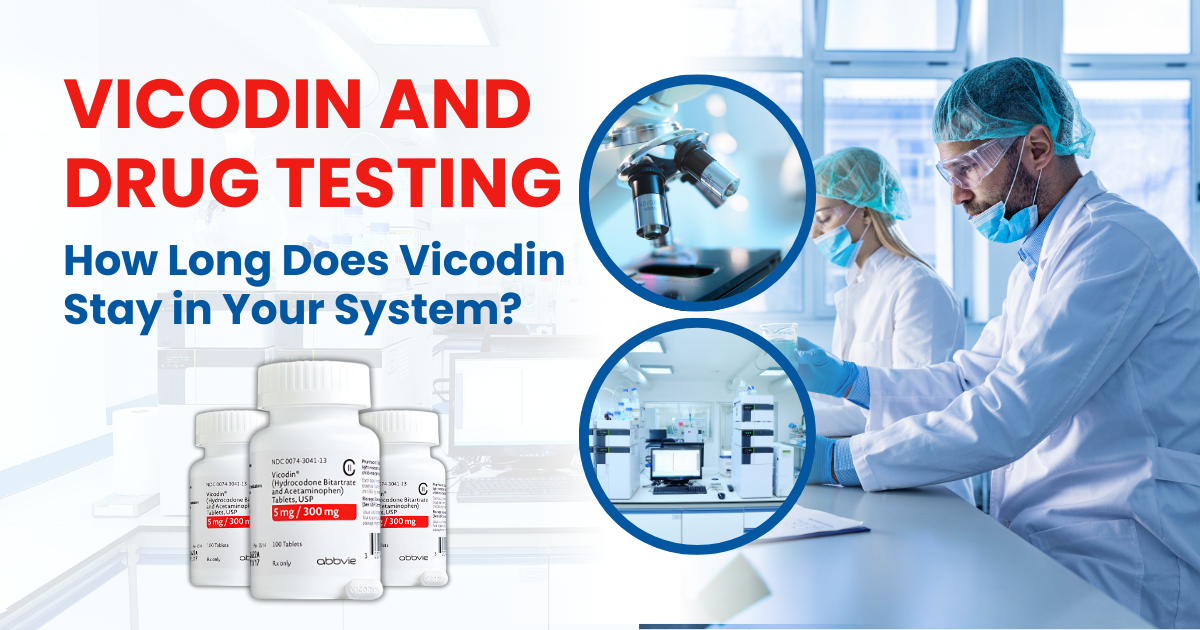
When it comes to drug testing, many people are concerned about how long drugs can stay in their system. This is especially true for prescription drugs like Vicodin, which contain a combination of hydrocodone and acetaminophen and are commonly used to manage pain. If you are taking Vicodin, it's important to know how long it can stay in your system and how it can affect drug test results. In this article, we will discuss everything you need to know about Vicodin and drug testing, including:
Vicodin is a prescription drug that contains a combination of hydrocodone and acetaminophen. Hydrocodone is an opioid pain medication, while acetaminophen is a non-opioid pain reliever. Vicodin is commonly used to manage moderate to severe pain, such as pain from an injury, surgery, or chronic conditions like arthritis. It is classified as a Schedule II controlled substance by the United States Drug Enforcement Administration (DEA) due to its high potential for abuse and dependence.
Vicodin works by binding to opioid receptors in the brain and spinal cord, reducing the perception of pain. It also increases the levels of dopamine in the brain, which can create feelings of euphoria and relaxation. Acetaminophen, on the other hand, works by blocking the production of certain chemicals in the body that cause pain and inflammation.
The amount of time that Vicodin stays in your system can vary depending on several factors, including your age, weight, metabolism, liver and kidney function, and the dosage and frequency of use. Generally, hydrocodone can be detected in urine for 3-4 days after the last use, while acetaminophen can be detected for up to a week. However, it is possible for both substances to be detected for longer periods of time in heavy or chronic users.
After ingestion, hydrocodone and acetaminophen are absorbed into the bloodstream and transported to the liver, where they are metabolized by enzymes. Hydrocodone is primarily metabolized by the liver enzyme CYP2D6, while acetaminophen is metabolized by a different enzyme called CYP2E1. The metabolites are then excreted through urine, feces, and sweat.
Vicodin can be detected in drug tests through the detection of its metabolites in bodily fluids, such as urine, blood, or saliva. However, drug tests do not typically test for the presence of Vicodin itself, but rather for the presence of its metabolites, such as hydrocodone or acetaminophen.
There are several types of drug tests that can detect Vicodin metabolites, including urine tests, blood tests, saliva tests, and hair tests. Urine tests are the most common type of drug test and can detect hydrocodone for up to 3-4 days and acetaminophen for up to a week after the last use. Blood tests are less common but can detect Vicodin metabolites for up to 24 hours after use. Saliva tests can detect hydrocodone for up to 48 hours and acetaminophen for up to 72 hours. Hair tests are the least common type of drug test and can detect Vicodin use for up to 90 days.
It is possible for Vicodin to show up as something else on a drug test if the test is not specifically designed to detect hydrocodone and acetaminophen. Hydrocodone can be detected as codeine or morphine, while acetaminophen may not be detected at all in some tests.
Drug tests for Vicodin metabolites are generally considered to be highly accurate. However, false positives can occur if the test is not properly administered or if the individual is taking certain medications or supplements that can cause cross-reactivity with the test.
There is no guaranteed way to get Vicodin out of your system faster, but there are some things you can do to help speed up the process. Drinking plenty of water and fluids can help flush out the metabolites from your system. Eating a healthy diet and getting regular exercise can also help improve your metabolism and aid in the excretion of the drug.
If you are taking Vicodin and are subject to drug testing, there are several risks to consider. First, you may test positive for Vicodin metabolites, which could result in legal or employment consequences. Additionally, if you are using Vicodin without a prescription or in larger doses than prescribed, you may be at risk for addiction, overdose, or other negative health consequences.
If you know you will be drug tested, it is important to consult with your healthcare provider before taking Vicodin or any other prescription medication. They can help you determine if it is safe to take Vicodin and provide guidance on how to manage pain without using opioids.
Drug testing for Vicodin differs from drug testing for other drugs in that it typically requires a specific test designed to detect hydrocodone and acetaminophen metabolites. Other drugs, such as marijuana or cocaine, can be detected through more general drug tests.
In conclusion, Vicodin can stay in your system for several days after use and can be detected in drug tests through the detection of its metabolites. It is important to follow your healthcare provider's instructions when taking Vicodin and to inform them if you are subject to drug testing. If you have concerns about Vicodin use or drug testing, speak with a healthcare professional for guidance.
